九年级上册unit2知识点总结和练习
2019-2020人教版九年级英语上册unit2基础知识复习和训练(含答案)
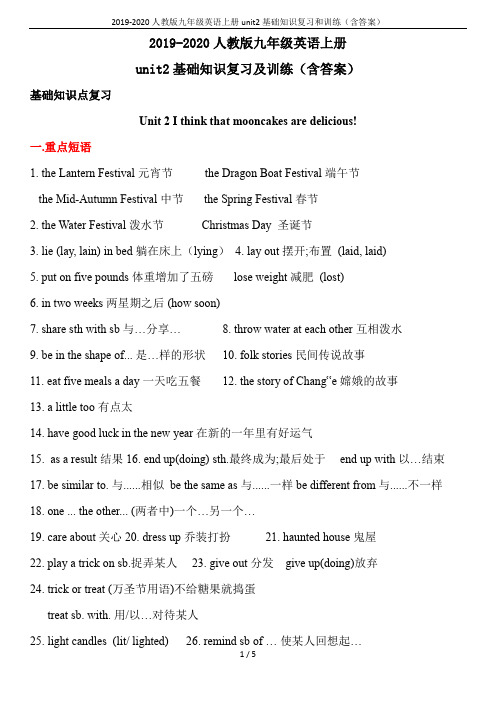
2019-2020人教版九年级英语上册unit2基础知识复习及训练(含答案)基础知识点复习Unit 2 I think that mooncakes are delicious!一.重点短语1. the Lantern Festival 元宵节 the Dragon Boat Festival 端午节the Mid-Autumn Festival 中节 the Spring Festival 春节2. the Water Festival 泼水节 Christmas Day 圣诞节3. lie (lay, lain) in bed躺在床上(lying)4. lay out摆开;布置 (laid, laid)5. put on five pounds 体重增加了五磅 lose weight减肥 (lost)6. in two weeks 两星期之后 (how soon)7. share sth with sb 与…分享…8. throw water at each other 互相泼水9. be in the shape of... 是…样的形状10. folk stories民间传说故事11. eat five meals a day 一天吃五餐12. the story of Chang‟e嫦娥的故事13. a little too有点太14. have good luck in the new year在新的一年里有好运气15. as a result结果 16. end up(doing) sth.最终成为;最后处于 end up with以…结束17. be similar to. 与......相似 be the same as与......一样 be different from与......不一样18. one ... the other... (两者中)一个…另一个…19. care about 关心 20. dress up 乔装打扮 21. haunted house 鬼屋22. play a trick on sb.捉弄某人 23. give out 分发 give up(doing)放弃24. trick or treat (万圣节用语)不给糖果就捣蛋treat sb. with. 用/以…对待某人25. light candles (lit/ lighted) 26. remind sb of …使某人回想起…二、重点句型1. I think that they’ re fun to watch.我认为它们看着很有意思。
仁爱版九年级英语上册Unit2 知识点总结
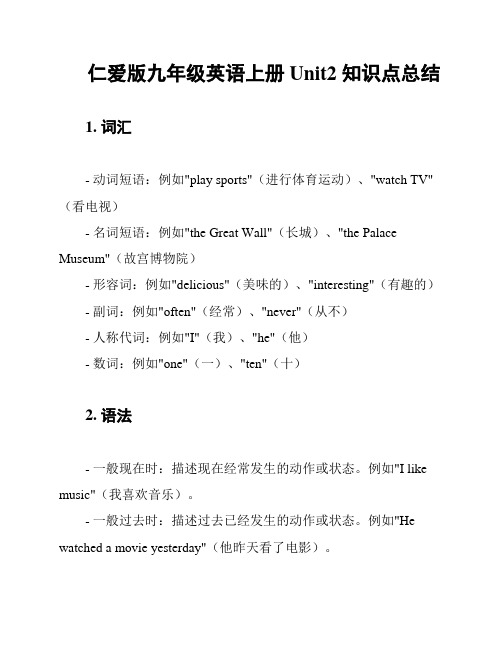
仁爱版九年级英语上册Unit2 知识点总结1. 词汇- 动词短语:例如"play sports"(进行体育运动)、"watch TV"(看电视)- 名词短语:例如"the Great Wall"(长城)、"the Palace Museum"(故宫博物院)- 形容词:例如"delicious"(美味的)、"interesting"(有趣的)- 副词:例如"often"(经常)、"never"(从不)- 人称代词:例如"I"(我)、"he"(他)- 数词:例如"one"(一)、"ten"(十)2. 语法- 一般现在时:描述现在经常发生的动作或状态。
例如"I like music"(我喜欢音乐)。
- 一般过去时:描述过去已经发生的动作或状态。
例如"He watched a movie yesterday"(他昨天看了电影)。
- 现在进行时:描述当前正在进行的动作。
例如"We are playing basketball"(我们正在打篮球)。
- 比较级与最高级:用于比较两个或多个事物的不同程度。
例如"He is taller than his brother"(他比他兄弟高)。
- 物主代词:表示所属关系。
例如"This is my book"(这是我的书)。
3. 句型- 陈述句:陈述一个事实或描述一个状态。
例如"I am a student"(我是一名学生)。
- 疑问句:用来提问。
例如"Do you like English?"(你喜欢英语吗?)。
九年级英语Unit 2知识点汇总
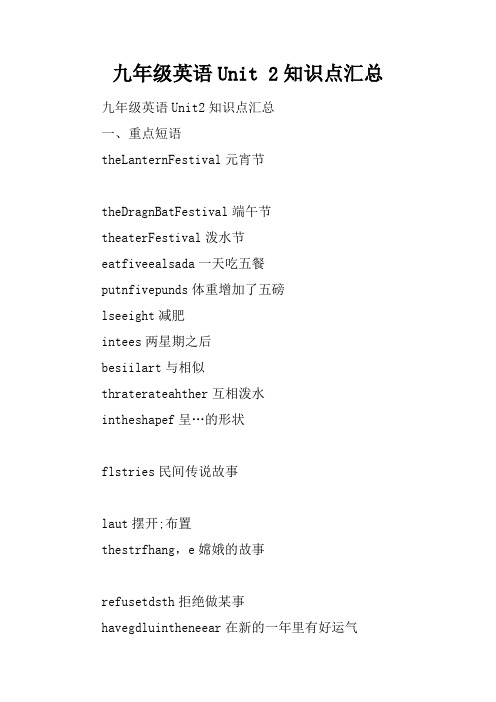
九年级英语Unit 2知识点汇总九年级英语Unit2知识点汇总一、重点短语theLanternFestival元宵节theDragnBatFestival端午节theaterFestival泼水节eatfiveealsada一天吃五餐putnfivepunds体重增加了五磅lseeight减肥intees两星期之后besiilart与相似thraterateahther互相泼水intheshapef呈…的形状flstries民间传说故事laut摆开;布置thestrfhang,e嫦娥的故事refusetdsth拒绝做某事havegdluintheneear在新的一年里有好运气endup最终成为;最后处于endupith以…结束sharesthithsb与…分享…asaresult结果nethether一个…另一个…areabut关心20dressup乔装打扮hauntedhuse鬼屋plaatrinsb捉弄某人giveut分发giveup放弃trirtreat不给糖果就捣蛋lightandlestheiprtanef…的重要性taesbarund…=shsbarund…带某人到处走走arnsbtdsth警告某人做某事arnsbnttdsth警告某人不要做某事thebeginningfnelife新生命的开始reindsbf…使某人回想起…prisetdsth承诺做某treatsbith用/以…对待某人二、重点知识点stranger用法n陌生人=strange+r【拓展】异乡人,外地人,新来者Iaastrangerhere我不是本地人2putn用法增加体重;发胖;穿上,戴上;上演,举办putn的其他含义:①穿上;戴上therputnheratandentut②上演;举办nesuerurhildrenputnapla 3steal用法vt偷,窃取stle—stlen;stealsthfrsb/s从某人或某地偷某物4laut用法laut摆开,布置lautsthins将某物摆放在某处lav安置,安放,产卵,下蛋laidlaidlie平躺lalainlie撒谎liedliedadire用法vt欣赏,仰慕+sb/sthadiresb/sthfrsth因某事而佩服/欣赏某人6trirtreat不请客就捣蛋trin花招,把戏plaatrinsb捉弄某人treat用法:n款待,招待v款待,请客It’streat我请客treatsbtsth请某人吃…看待;当作与as连用treat…as…把当作治疗hihdtrsaretreatinghifrhisillness为某人治疗7punish用法v处罚,惩罚bepunishedfr因…受惩罚npunishentadpunishable应惩处的,可依法惩处的8arn用法v警告,告诫1)arnsbtdsth警告,告诫某人做某事2)arnsbabutsth提醒/告诫某人注意某事3)arnsbf/againststh告诫某人提防某事4)arnthat从句9dead用法是形容词,意为“死的;失去生命的”,常用于名词前定语或作系动词的表语。
译林英语九年级上册第二单元unit 2重要知识点总结
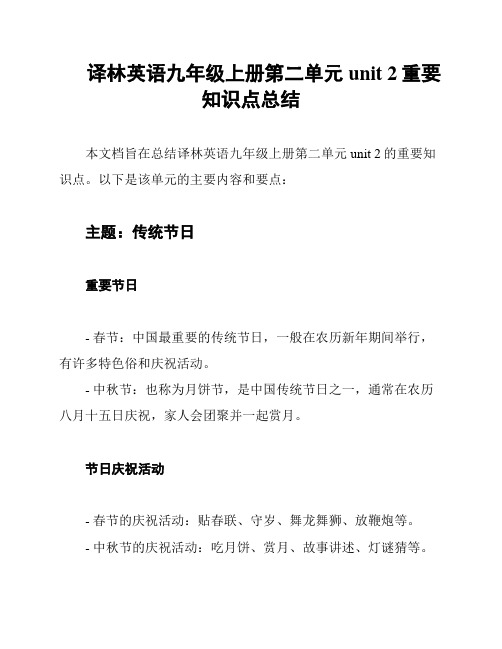
译林英语九年级上册第二单元unit 2重要知识点总结本文档旨在总结译林英语九年级上册第二单元unit 2的重要知识点。
以下是该单元的主要内容和要点:主题:传统节日重要节日- 春节:中国最重要的传统节日,一般在农历新年期间举行,有许多特色俗和庆祝活动。
- 中秋节:也称为月饼节,是中国传统节日之一,通常在农历八月十五日庆祝,家人会团聚并一起赏月。
节日庆祝活动- 春节的庆祝活动:贴春联、守岁、舞龙舞狮、放鞭炮等。
- 中秋节的庆祝活动:吃月饼、赏月、故事讲述、灯谜猜等。
词汇和短语- 重要词汇:节日、传统、庆祝、举行、特色、俗、贴春联、守岁、舞龙舞狮、放鞭炮、月饼、赏月、故事讲述、灯谜猜。
- 实用短语:Happy Spring Festival!(春节快乐!)、Enjoy the mooncakes!(品尝月饼吧!)、Guess the riddles!(猜猜灯谜吧!)等。
语法要点- 肯定句和否定句:用于陈述事实或否定事实的句子结构。
- 一般疑问句:用于询问事实的句子结构。
- 特殊疑问句:用于询问特定细节、原因、方式等的句子结构。
阅读理解技巧- 根据文章内容回答问题:仔细阅读文章,理解文章主旨和细节,根据题目的要求回答问题。
- 推理判断:在理解文章的基础上,运用逻辑推理能力做出正确的判断。
- 查找信息:通过阅读文章,找出相关信息以回答问题。
本文档总结了译林英语九年级上册第二单元unit 2的重要知识点,包括传统节日、节日庆祝活动、词汇和短语、语法要点以及阅读理解技巧。
通过掌握这些知识点,你将更好地理解和应用本单元的内容。
新版九年级unit2知识点精讲及试题精炼

新版九年级unit2知识点精讲及试题精炼unit2 I think that mooncakes are delicious.1.What a great day!考点:此句是由what 引出的感叹句,⼝语中感叹句通常省略主语和谓语。
What a new watch!感叹句句式:除主语外(1)如果没有名词,⽤how感叹How clever (she is)!(2) 如果是名词复数或不可数名词,⽤what 感叹What good boys they are!What interesting the news is!(3)如果是名词单数可⽤how 和whatWhat a beautiful girl she is!How beautiful a girl she is!2.Bill wonders whether they’ll have zongzi again next year.考点⼀:wonder 做动词,“想知道;想弄明⽩”相当于 want to knowI wonder what the new teacher will be like.考点⼆:Bill wonders whether they’ll have zongzi again next year.学⽣简单了解宾语从句即可。
我想知道能否⽤⼀下你的⾃⾏车。
他不知道是否要留下来。
我不确定⽕车是否会准时到达。
3.Wu Ming and Harry are cousins/ strangers/ friends.考点:stranger“陌⽣⼈”由形容词strange加r 构成的名词。
A stranger walked up to me and shook my hands.学⽣回忆有相同构词法的词:4.I’ve put on five pounds.考点:put on “增加(体重);发胖”快点穿上你的⾐服。
学⽣回忆下列动词词组的意思:put off take off set up clean up cheer up5.I wonder if it’s similar to the Water Festival of the Dai people in Yunnan Province.考点:similar 是形容词,“相似的;相象的”⽆⽐较等级,常⽤短语: be similar to……“与…相似”She is similar to her mother.They are similar, but they are not the same.6.Chinese people have been celebrating Mid-Autumn Festival and enjoying mooncakes forcenturies.考点⼀:该句⽤的是现在完成进⾏时,结构为: have/ has + been +doing 注意和现在完成时的区别We have been cleaning the classroom.We have cleaned the classroom.考点⼆:学⽣总结for和since的区别We (study)here for six years.we (study)here since six years ago.we (study) here six years ago.My life _____ a lot in the last few years.A. changeB. changesC. have changedD. has changed7.They carry people’s wishes to the families they love and miss.考点⼀:wish 名词“祝福;祝愿”My wish is to be a doctor.动词“希望;想要”Do you wish a pen or a book?wish 和hope的区别:wish to do sth.wish + that 从句wish sb. +名词hope to do sth.hope + that 从句考点⼆:miss 动词“思念;想念;错过”Don’t miss the bargain.8.However, most people think that the story of Chang’e is the most touching.考点⼀:however“然⽽;不过”有转折的含义相当于but。
仁爱九年级上册unit2知识点总结
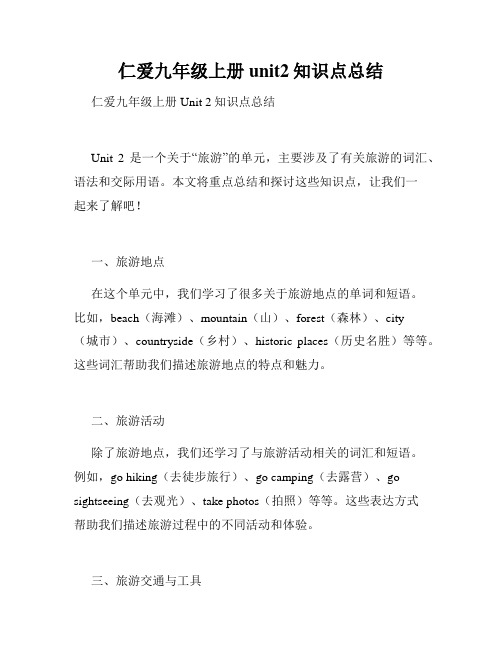
仁爱九年级上册unit2知识点总结仁爱九年级上册Unit 2知识点总结Unit 2是一个关于“旅游”的单元,主要涉及了有关旅游的词汇、语法和交际用语。
本文将重点总结和探讨这些知识点,让我们一起来了解吧!一、旅游地点在这个单元中,我们学习了很多关于旅游地点的单词和短语。
比如,beach(海滩)、mountain(山)、forest(森林)、city(城市)、countryside(乡村)、historic places(历史名胜)等等。
这些词汇帮助我们描述旅游地点的特点和魅力。
二、旅游活动除了旅游地点,我们还学习了与旅游活动相关的词汇和短语。
例如,go hiking(去徒步旅行)、go camping(去露营)、go sightseeing(去观光)、take photos(拍照)等等。
这些表达方式帮助我们描述旅游过程中的不同活动和体验。
三、旅游交通与工具在旅行过程中,我们需要使用各种交通工具。
比如,plane(飞机)、train(火车)、bus(公共汽车)、car(汽车)等等。
另外,我们还学习了用于描述旅行方式的动词短语,如take a flight(坐飞机)、catch a train(乘火车)、drive a car(开车)等等。
四、描述感受和经历旅游不仅仅是到达一个地方,还包括了我们的感受和经历。
所以,我们也需要学习如何用英语来表达这些体验。
例如:have a great time(度过美好时光)、enjoy oneself(享受自己)、feel excited(感到兴奋)、be amazed by(被...惊叹)等等。
五、语法知识在本单元中,我们学习了一些重要的语法知识。
例如,现在进行时表示现阶段正在进行的动作或情况。
例如,I am visiting my grandparents this weekend.(这个周末我正在拜访我的祖父母。
)此外,我们还学习了宾语从句,用来描述我们对某个地点的看法或者体验。
九年级unit2数学知识点总结
九年级unit2数学知识点总结九年级Unit 2 数学知识点总结在九年级数学学习中,Unit 2 是一个重要的单元,涉及到了许多数学知识点。
本文将对该单元的知识点进行总结和梳理,以帮助同学们更好地理解和掌握这些内容。
一、方程与不等式方程是数学中的一种基本工具,也是解决问题的关键方法之一。
通过等式可以找到未知数的值,辅助解决实际问题。
在这个单元中,同学们学习了一元一次方程的解法,包括加减、乘除、合并同类项等操作。
同时,也学习了含有分式和绝对值的方程,以及多项式方程。
而不等式则是方程的一种扩展,它们表达了数值之间的大小关系。
在这个单元中,同学们不仅学习了一元一次不等式的解法,还学习了一元二次不等式和绝对值不等式的解法。
二、函数在数学中,函数是一个非常重要的概念。
函数可以理解为一种映射关系,通过给定的自变量,可以得到相应的函数值。
在Unit 2 中,同学们学习了数学中的函数概念和函数的表示方法。
特别是线性函数和二次函数,同学们学会了根据给定函数图像或函数表达式,确定函数的特征。
同学们也学习了函数的图像性质,如线性函数的图像是一条直线,二次函数的图像是一个抛物线等。
利用这些性质,同学们可以很方便地确定函数的性质和解决函数相关的问题。
三、平面图形平面图形是几何学的基础,也是实际生活中广泛运用的数学概念。
在Unit 2 中,同学们学习了直角三角形、勾股定理和正弦、余弦、正切等三角函数的应用。
同学们学会了计算直角三角形的面积和周长,掌握了三角函数的运用方法。
同时,同学们也学习了圆的相关知识,如圆的面积和周长的计算公式,并学会了计算弧长和扇形的面积。
四、统计与概率统计与概率是数学中的重要分支之一,也是我们日常生活中常常用到的方法。
在Unit 2 中,同学们学习了样本调查、频率分布表、频率直方图等统计概念和统计图像的表示方法。
同时,也学习了基本的概率计算方法,如样本空间、事件的概念和概率的计算公式。
通过学习这些知识,同学们可以更好地理解和应用统计与概率的方法,解决实际问题。
初中九年级英语Unit 2知识点资料总结
初中九年级英语Unit 2知识点资料总结【重点词组或短语】1.so interesting如此有趣2.dress up装扮,穿上盛装3.go to someplace for a vacation去某地度假4.on vacation在度假5.put on穿上;增加体重6.be similar to...与……相似7.throw water at each other互相泼水8.a full moon满月9.carry people’s wishes to...寄托人们对……的祝福10.traditional folk stories传统的民间故事11.the most touching最令人感动的12.shoot down射下;击落13.live forever长生不老14.refuse to do sth.拒絕做某事15.fly up to...飞向……16.call out one’s name大声呼喊……的名字y out摆开;布置18.admire the moon赏月19.share...with...和……分享……20.steal...from...从……偷y eggs下蛋22.admire sb.for...因……而佩服某人23.tie...to...把……绑/系在……上24.as a result结果25.light candles点蜡烛26.cartoon characters卡通角色27.take/show...around...带领某人参观28.ask for treats要求请客29.play a trick on sb.捉弄某人30.give sb.a treat招待某人31.treat sb.to sth.请某人吃……32.the true meaning真谛,真正的含义33.the spirit of...……的精神34.a novel written by...由……写的小说35.care about关心;在乎36.business partner生意伙伴37.punish sb.for sth./doing sth因……惩罚某人38.warn sb.to do sth.告诫/警告某人做某事39.end up结束,告终40.give birth to生(孩子),生育;产生41.not only...but also不仅……而且……42.promise to do sth.承诺/答应做某事43.a mean person一个吝啬的人44.tell a lie撒谎【重难点句子】1.I wonder if it’s similar to the Water Festival of the Dai people in Yunnan Province.我想知道它是否与云南傣族的泼水节相似。
人教版九年级英语Unit2知识点总结
⼈教版九年级英语Unit2知识点总结⼈教版九年级英语Unit2《I think that moon cakes aredelicious!》知识点1.Spring festival 春节the Lantern Festival 元宵节Women’s Daythe Dragon Boat Festival 端午节the Water Festival 泼⽔节April Fool’s day 愚⼈节Tree Planting DayMay DayChildren’s DayMo ther’s DayFather’s DayMid-autumn FestivalHalloweenThanks Giving DayChristmas Day第 1 页共14 页Easter2. be fun to watch 看着很有意思have fun doinghave problems/trouble/difficulty in doing have a hard/difficult time in doing3. eat five meals a day ⼀天吃五餐4. put on five pounds 体重增加了五磅lose weight5. in two weeks 两星期之后how soon in & after6. be similar to... 与.......相似the same asbe different from7. end up最终成为;最后处于ending by the end ofin the end=at last=finallyat the end of第 2 页共14 页end up with..8. share sth. with sb. 与……分享……9. as a result结果10. one,. . the other... the others(两者中的)⼀个……另⼀个……other & others some… others….⼀些…另⼀些another one =one more another two=two more11. take sb. out for dinner 带某⼈出去吃饭12. dress up 乔装打扮dress up asput on, wear, in, dress+⼈13. haunted house ⿁屋14. call out ⼤声呼喊shout out shout to & shout at15. remind sb. of 使某⼈想起remind sb. that…remind sb. to do sth.第 3 页共14 页16. sound like 听起来像look like smell like feel like taste like 17. treat sb. with. ⽤/以……对待某⼈treat / regard as..18. the beginning of new life 新⽣命的开始19. care about 关⼼在乎care for=look after=take care of…take care=look out=be carefulcare—careful/careless--carefully20.not only ……but also……不但……⽽且……either… or 或者…或者neither.. nor…there be21.shoot down 射下shoot at 朝..射击/doc/c46103827.htmled to do 过去常常做……be/get used to doing习惯于做某事第 4 页共14 页be used to do=be used for doing被⽤来做某事sth. be used to do sth.put into good use 好好利⽤23.give/hand out 分发发放hand in 上交give away 分发,赠送24.next year 明年the next year 第⼆年25.each other=one another 互相彼此26.in the shape of 以……的形状27.on mid-autumn night 在中秋之夜28.fly up to 飞向fly-flew-flown flight n./doc/c46103827.htmly out 摆开布置躺lie-lay-lain lying说谎lied-lied-lied lying布置,产卵lay-laid-laid laying/doc/c46103827.htmle/go/be/get back 回来return31.more and more popular 越来越受欢迎第 5 页共14 页the +⽐,the +⽐as…as not as/so.. asthe +⽐32.think of 想起认为思考think about-think over-think hard33.the importance of ……的重要性34.make/earn money 挣钱35.in need 需要帮助处于困境中in danger/trouble/silence/agreement/time/36.between ……and…… 在……和……之间among37.like best 最喜欢favorite38.go to ……for a vacation 去……度假39.wash away 冲⾛洗掉40.the tradition of ……的传统41.at night 在夜⾥在晚上in the nightall night all day第 6 页共14 页42.have to 必须不得不must can may43.play a trick on sb 捉弄某⼈play a joke on sb.44.the spirit of ……的精神45.wake up 醒来feel sleepy- go to bed- fall a sleep/go to sleep—be asleep-wake up-be awake-get up46.the beginning of ……的开始47. 感叹句式⼀:What+(a/an)+adj+名词(+主语+谓语+其他)!多么……的……感叹句式⼆:How +adj/adv+主语+谓语+其他!……多么……!48.give sb. sth. 给某⼈某物give sth. to sb.pass/send/write/lend/show/offer49.plan to do sth 计划做某事have a plan to do50.refuse to do sth 拒绝做某事第7 页共14 页turn down51.one of +名词复数形式……之⼀53.it +is+名词/形容词+动词不定式(to do sth)做某事是…54.what …think of…?认为…怎么样?How…like…55.make/let/have sb do sth 让某⼈做某事变被动还原to56.warn sb(not)to do sth告诫某⼈做某事advise/tell/ask sb. (not) to do sth.57.decide to do sth 决定做某事make a decision to domake up one’s mind to do58.promise to do sth 承诺、答应做某事59.宾语从句⼀.连词a.陈述语序(that)b.⼀般疑问句(if 或whether)c.特殊疑问⼆.陈述语序三.时态第8 页共14 页可跟that从句做宾语的动词:say, think, insist, wish, hope, demand, imagine, wonder, know, see, believe, agree, admit, deny, expect, explain, order, command, feel, dream, suggest, hear, mean, notice, prefer, request, require, propose, declare, report等例:I don’t know what they are looking for.Could you tell me when the train will leave?注意:当主句谓语动词是think, believe, suppose, expect 等词,⽽宾注意:由whether,if 引导的宾语从句由whether(if)引导的宾语从句,实际上是⼀般疑问句演变⽽来的,意思是“是否”。
人教版九年级上册unit2知识点总结
人教版九年级上册unit2知识点总结人教版九年级上册Unit 2《How often do you exercise?》知识点总结在人教版九年级上册Unit 2中,我们学习了关于频率的表达以及一些与日常活动相关的单词和短语。
本文将对这些知识点进行总结。
首先,我们来讨论关于频率的表达。
英语中,我们可以用副词来表达某个活动的频率,常见的副词有:always、usually、often、sometimes、rarely和never。
这些副词可以用来回答关于频率的问题,比如"How often do you exercise?"(你多久锻炼一次?)".I always exercise three times a week."(我每周锻炼三次。
)。
另外,我们还可以通过使用频率副词词组来表示不同程度的频率,比如:once a day(每天一次)、twice a week(每周两次)等。
其次,我们学习了一些与日常活动相关的单词和短语。
比如,我们可以用watch TV(看电视)、play sports(进行体育运动)、surf the Internet(上网冲浪)等来描述我们的日常活动。
另外,我们还学习了一些与运动和锻炼相关的单词和短语,比如:go jogging(去慢跑)、do yoga(做瑜伽)等。
除此之外,我们还学习了一些表示频率的动词,比如:exercise (锻炼)、swim(游泳)、dance(跳舞)等。
这些动词可以用来回答关于频率的问题或者描述我们的日常活动。
在学习这些知识点的过程中,我们还进行了一些实践活动,比如问卷调查。
通过这些实践活动,我们可以更加深入地理解和运用这些知识点。
我们可以设计一个关于频率的问卷调查,来了解同学们各种活动的频率和喜好。
此外,我们还学习了一些表示频率的词组和句型,比如:twice a week(一周两次)、once a month(一个月一次)、every day(每天)、most of the time(大部分时间)、on weekends(在周末)等。
- 1、下载文档前请自行甄别文档内容的完整性,平台不提供额外的编辑、内容补充、找答案等附加服务。
- 2、"仅部分预览"的文档,不可在线预览部分如存在完整性等问题,可反馈申请退款(可完整预览的文档不适用该条件!)。
- 3、如文档侵犯您的权益,请联系客服反馈,我们会尽快为您处理(人工客服工作时间:9:00-18:30)。
朝阳学校 83377123 中小学1对1课外辅导专家 1 朝 阳 学 校 九 年 级 英 语 学 案 教师: 学生: 日期: 科目: 英语 时段: 课 题 Unit 2 I used to be afraid of dark. 学习目标 考点分析 1、学会陈述自己过去常做的事情
2、能够表达自己现在和过去在外表、性格、娱乐等方面的变化
学习重点 重点:学会陈述自己过去常做的事情 难点:学会陈述自己过去常做的事情
学习方法 分析、对比、归纳总结和练习相结合
学习内容与过程 【语言点】 1. used to句型的用法: 结构:“主语+used to+动词原形+其它”。 used to的含义为“过去常常”。表示过去的习惯,暗示现在已无此习惯。这个词组只用于讲述过去,我们不能用use to来讲述现在。 否定形式: didn’t use to…. (否定也用usedn’t,是较老的英国英语的用法,现在用得很少。) 问句形式:Did you use to…? 例如: Dave used to work in a factory. (肯定句) (隐含的意思是:Dave worked in a factory before but he doesn’t work there now.) The shop didn't use to (usedn't to) open on Sundays. 这家商店过去星期日不营业。(否定句) 对过去事情的描述: 外貌描述: used to +be + adj ( short, tall, medium height, slim, bald等) used to have + (long hair, short hair, curly hair, blond hair等) 性格描述:used to + be + adj ( generous, wild, quiet, intelligent等) 习惯爱好:be used to + do sth ( get up early, eat junk food等) 2. 词语辨析:
used to do、be used to doing 、be used to do 和 be used for sth./doing . ① used to do “过去常常做某事” ②be / get used to doing / sth.是“习惯于做某事”,后面接名词或动名词,可用于现在、过去、将来的多种时态。如: I am used to the weather here. 我已经习惯这里的天气了。 He will be used to getting up early. 他将会习惯于早起。 朝阳学校 83377123 中小学1对1课外辅导专家 2 You will soon get used to the weather here. 你会习惯这里的天气的。 In the end, I got used to doing the hard work. 最后,我终于习惯干苦活了。 ③ be used to do sth. 一般是物体做主语,某物“被用于做某事”,不定式表示目的。 Wood is used to make paper. 木材被用来造纸。 ④ be used for + n. / v-ing 意思是“用于,用作„„”,介词for表示用处。 The pen is used for writing. 钢笔是用来写字的。 3. “害怕”短语: terrified为形容词,表示“害怕„„, 恐惧„„”。 固定用法be terrified of = be afraid of + n/ doing 。 I’m terrified of the dark. I’m terrified of being at home by myself. 特别提示: terrified的动词形式为terrify,表示“使害怕”,“使恐惧”。 There are several persons terrifying the little boy. 4.“with+名词+介词短语”结构的用法 可用作状语,表示伴随情况。 I go to sleep with my bedroom light on. 我开着卧室的灯睡觉。
He walked out of the room with his coat on. 他穿着外套走出了房间。 The teacher came in with a book under his arm. 5.“花费”短语用法: 人+ spend spend+时间/金钱+on / (in ) doing sth She spends a lot of money on books 人 + pay pay+时间+for sth How much did you pay for all these books? 物 + cost sb + 金钱 The dictionary cost me 40 yuan. It takes sb some time to do sth. It’ll take only ten minutes to walk to the supermarket. 6.“死”的区别:
◎dead: adj意为“死的”,表示“死的,无生命的”,常与be动词连用,指死的状态。 ◎die: v“死亡,断气”,是终止性动词,指生命的结束,强调动作。 ◎dying是die的现在分词,常作形容词使用,意为“要死的”,“垂危的”,“濒临死亡的”。 ◎death: n 意为“死亡”。 However, after his father’s death a few years ago, Martin’s life became much more difficult. His mother died two years ago. This dog is dying. 朝阳学校 83377123 中小学1对1课外辅导专家 3 It makes me very sad when I think of my little dog’s death. 7. even though = even if,用来引导让步状语从句。 意为“即使,纵然,尽管” He won’t tell me about it even though (even if)he knows the news.
Even though (Even if)you aren’t lifting anything, your muscle gets tired. 8. pride/ proud的用法: ① pride是抽象名词,意为“骄傲,自豪”。
take pride in+ n /doing/代词。意为“对„„感到自豪”,强调动作性。 The young man took pride in his work. 这年轻人以他的工作而自豪。 ② proud:adj 意为“骄傲的,自豪的” be proud of + n /代词。 She is very proud of her son. 9. seem 的用法: It seems that Yu Mei has changed a lot. (P15)俞梅似乎变化很大。 动词seem是“看起来像”,“似乎”的意思,其常用的句型有: ◎It seems+that 从句 It seems that he would never be able to work out the question. ◎seem+形容词 Your father seems quite happy. ◎seem+动词不定式 Li Fang seems to know everything. 特别提示 “It seems+that 从句”通常可以转化成“名词/代词+seems+动词不定式短语”这一简单句型,如果动词不定式短语是“to be+形容词”,to be可以被省略。 It seems that his temperature is all right. =His temperature seems (to be)all right. 他的体温似乎很正常。 It seems that she gets on well with her classmates. =She seems to get on well with her classmates. 她似乎与同学们相处得不好。
【重点短语】 害怕… be terrified of sth. 过去常常做某事 used to do sth. 放弃做某事give up doing sth. 能做某事be able to do sth. 与某人闲聊chat with sb. 以…而自豪take pride in sth. 对…注意,留心pay attention to sth. 入睡 go to sleep 下决心 make a decision 即使 even though 令某人惊奇的是 to one’s surprise 终于、最后in the end 朝阳学校 83377123 中小学1对1课外辅导专家 4 做决定make a decision 不再 no longer = not … any more 课堂练习 I. “used to ” 中考真题
1. Mike afraid of dogs, but now he can play with them. (2006黑龙江佳木斯) A. is used to being B. used to being C. used to be 2. Dennis really quiet, but now he is very outgoing. (2006内蒙古呼和浩特) A. used to be B. was used to be C. is used to be D. used to being 3. ---My aunt goes to climb Mount Gu every Sunday. ---Oh? But she hate climbing mountains. (2006福建福州) A. used to B. use to C. uses to D. is used to 4. Look, that’s our new school building. There be old and low houses. (2006福建厦门) A. is going to B. had C. used to II. “used to” 句型转换 1. I used to be really shy. (改为一般疑问句,并作肯定回答) you really shy? , . 2. My mother used to hate cooking meals. (对划线部分提问) your mother to hate? 3. I used to go outside on Sundays. (改为否定句) I go outside on Sundays. 4. Did you use to enjoy shopping on weekends? (改为肯定句) I shopping on weekends. 5. My little brother used to be afraid of the dark. (完成反意疑问句) My little brother used to be afraid of the dark, ? III. 用used to, be used to, be/get used to 或be used for 的适当形式填空。 1. Alice be a doctor. 2. This room keeping all the junk. 3. My mother drinking coffee after dinner. 4. Tom the cold weather after having lived here for two years. 5. Cookers cook by cooks. [中考聚焦] 考点1. used to Maria shy, but now she is quite outgoing. She has made lots of friends. (2006宁夏) A. was used to be B. used to be C. was used to being D. is used to be
